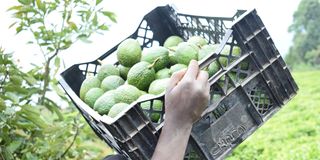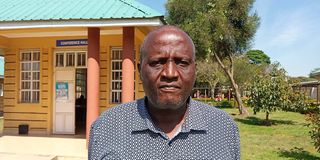Why farmers in Subukia want Kenyans to eat improved avocado varieties

A farmer carries a crate of avocados to the weighing scale.
Mwangi Waithaka an avocado farmer in Subukia has experienced many highs in his avocado farming journey.
However, the low consumption of improved avocado varieties by Kenyans continues to hinder the expansion of his agribusiness.
Waithaka who farms the Hass and Fuerte varieties on his three-acre farm in Subukia sub-county says that an improvement in local consumption would help to counter some of the losses avocado farmers incur during the peak seasons.
"Even when prices aren't at their best, avocado still outperforms other crops. However, during peak season, exporters tell us that the market becomes flooded with fruits from countries like Peru, Mexico, and South Africa. This oversupply leads to fewer orders for our produce."
This he says is a problem the local market might be able to solve.

Mwangi Waithaka an avocado farmer in Subukia.
“Our local markets can cater to the deficit. Unfortunately, the fruit here fetches meagre prices and is priced in gunny bags or per fruit. Usually, a piece goes for Sh. 5 which roughly translates to Sh. 25 per kilo when sold in gunny bags, a blow to the money offered by exporters," he says.
Waithaka who intends to increase his acreage production to six notes that on the off-peak seasons when the competition is not as high farmers make bank from the venture.
He notes that he has consistently gotten good rates for his fruit over the years, with the Hass variety selling for as much as Sh. 80–100 per kilogram and the Fuerte variety fetching Sh. 60 or more.
Like Waithaka, Josephat Kaniu also intends to increase his acreage owing to the profit he makes from the green gold.
The mixed crop farmer who has four acres of his 21-acre farm on avocado also agrees that while establishing the crop may somewhat seem expensive, it is cheaper in the long run.
“I started farming avocados about 8-9 years ago. I’d heard the crop was profitable and wanted to see it for myself. I started with an acre and over the years gradually increased to two, now four, and soon I intend to increase this with three acres,” he says.
Compared to other crops he’s farming, Kaniu notes that proceeds from the fruit, although they vary with the time they get to him, almost never go into land preparation or input buying unless when expanding, unlike crops like maize.
Over the years his yield has averaged between 1,200kg for the Fuerte variety and 1,500 kilograms of the Hass variety which fetches him between Sh. 30-40 per kilo and Sh. 50-60 per kilo respectively.
His greatest challenge however, has been in combating diseases, especially for his Hass variety (falling leaves and a rust-like substance underneath the leaves) which he is actively looking for experts to help him counter this.
